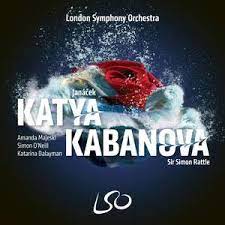JANÁČEK Katya Kabanova (Rattle)
View record and artist detailsRecord and Artist Details
Genre:
Opera
Label: LSO Live
Magazine Review Date: 03/2024
Media Format: Digital Versatile Disc
Media Runtime: 99
Mastering:
DDD
Catalogue Number: LSO0889

Tracks:
| Composition | Artist Credit |
|---|---|
| Katya Kabanova |
Leoš Janáček, Composer
Amanda Majeski, Katya, Soprano Andrew Staples, Tichon, Tenor Claire Barnett-Jones, Glaša; Fekluša, Mezzo soprano Katarina Dalayman, Kabanicha, Mezzo soprano Ladislav Elgr, Kudrjáš, Tenor London Symphony Chorus London Symphony Orchestra Lukas Zeman, Kuligin, Baritone Magdalena Kozená, Varvara, Mezzo soprano Pavlo Hunka, Dikoj, Bass-baritone Simon O’Neill, Boris, Tenor Simon Rattle, Conductor |
Author: Tim Ashley
This Katya Kabanova forms the second instalment of Simon Rattle’s LSO Live series of Janáček’s major operas, begun in summer 2019 with The Cunning Little Vixen, avowedly one of Rattle’s own favourite works. That recording, admired by Hugo Shirley in these pages on its release the following year (10/20), was indeed exceptionally fine, though the new Katya strikes me as very much the greater achievement, both in vocal excellence and dramatic cogency. In the hall for the first of the concerts at which it was recorded, I found it utterly overpowering, which the transfer to disc hasn’t in any way lessened. In the interim, of course, we have also had the DVD release of Jakub Hrůša’s 2022 Salzburg performance (Unitel, 10/23), equally compelling, if very different: both recordings are among the most significant of the work since Charles Mackerras’s benchmark Decca set (10/77).
Whereas Hrůša, the more immediately confrontative interpreter of the two, sustains a relentlessly high emotional pitch throughout, Rattle builds the tension gradually and cumulatively, though the yearning and menace characteristic of the performance as a whole are very much present in the string phrases and timpani motto heard at the start. The LSO are on tremendous form throughout, and what follows is an unflinching journey into both beauty and darkness, as sensuousness repeatedly collides with incipient violence.
Rattle briefly allows time almost to stand still in the opening scene as Boris watches Katya walk home from church, and the swaying theme, with its echoes of Puccini’s Butterfly, that accompanies her first appearance has rarely sounded so beguiling. Sensuality and spirituality seem dangerously close, however, when we reach the second scene, and undulating strings and woodwind trace Katya’s memories of angelic visions, her dreams of flying and escape, and the sense of religious guilt that will eventually destroy her.
A deeper eroticism pervades the parallel love duets of Act 2, one rapturous if guilty, the other knowingly urbane. Elsewhere, however, there is frightening rawness in the hammering brass monotones and ricocheting string phrases that close Act 1, and in the engulfing ferocity of the storm that pushes Katya over the edge. Rattle reserves the climax, however, for her final encounter with Boris, in which a vast surge of emotion at their reunion only collapses into to heartbreaking bleakness and despair.
In all this, he is helped immeasurably by Amanda Majeski as Katya, the role with which she made her name in the UK at Covent Garden in 2019. This is another great interpretation, again at once equal to, yet very different from, the impulsive brightness and rebelliousness of Hrůša’s Corinne Winters. Majeski’s tone is warm and creamy – this is a most beautiful voice – and we’re aware from the outset of the dignity her Katya has so far managed to preserve in the most brutal circumstances. The long solo in which mystic yearning gives way to half-voiced desire is ravishingly done, but it’s not until the second act that the extent and almost uncontainable depths of her feelings become apparent, first in the eager way she attempts to stifle her own guilt in taking the key that Varvara has left for her, then in her ecstatic yielding of her own will to Boris’s prior to their first making love. The confession at the height of the storm is almost unnervingly wrenched from her. Later, as she repeatedly cries out in desperation for Boris on the banks of the Volga, her singing has a harrowing immediacy that only great artistry can achieve.
Her Boris, meanwhile, ardent if dithering, and occasionally metallic in tone, is Simon O’Neill: I prefer the greater lyrical warmth of David Butt Philip for Hrůša here, though O’Neill finely captures the weakness of will that Katya fatally cannot see behind the man’s glamour. Katarina Dalayman makes a formidable Kabanicha: bitter, declamatory and hurling out flinty top notes like weaponry. She clearly has Pavlo Hunka’s obnoxious Dikoj in thrall, though Andrew Staples’s unusually sympathetic Tichon seethes with growing resentment at her influence: his final imprecations suggest he will finally break away from her once the main narrative has run its course. Magdalena KoŽená, meanwhile, is the best of all Varvaras, self-willed, spirited and compassionate opposite Ladislav Elgr’s Kudrjáš, darker voiced, reflective rather than caustic, reminding us that the man is a scientist and intellectual, after all. The recording itself places the voices fractionally far forwards in the opening scenes. The balance soon settles, however, and the storm, when we reach it, is astonishingly engineered and utterly terrifying.
Like the Hrůša DVD, this is a great achievement, in short, and we’re lucky to have had two such exceptional recordings of the work in so short a space of time.
Explore the world’s largest classical music catalogue on Apple Music Classical.
Included with an Apple Music subscription. Download now.

Gramophone Digital Club
- Digital Edition
- Digital Archive
- Reviews Database
- Full website access
From £8.75 / month
Subscribe
Gramophone Full Club
- Print Edition
- Digital Edition
- Digital Archive
- Reviews Database
- Full website access
From £11.00 / month
Subscribe
If you are a library, university or other organisation that would be interested in an institutional subscription to Gramophone please click here for further information.




